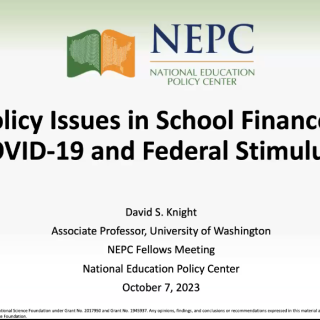David S. Knight
Dr. David Knight is Associate Professor and co-Director of the Education Policy Analytics Lab at the University of Washington. He also serves as Principal Investigator (PI) of a $1.5 million grant from the National Science Foundation, exploring teacher turnover during the COVID-19 era using statewide longitudinal data systems from Texas and Washington. He serves as co-PI of a grant from W. T. Grant Foundation exploring the impacts of school finance reforms and as co-PI of a Lyle Spencer Foundation grant examining the impacts and cost of dual credit education. Dr. Knight’s research focuses on the economics of education and school finance. He studies educational systems through the lens of economic theory and methodologies. His work emphasizes distributive justice, racial/ethnic and socioeconomic finance equity, and policies aimed at reducing inequality and addressing longstanding racial and income-based disparities in educational opportunity. He holds a Ph.D. in educational policy and a master’s degree in economics from the University of Southern California. Dr. Knight previously served as Assistant Professor at the University of Texas at El Paso College of Education and as Director of the Center for Education Research and Policy Studies at the University of Texas at El Paso.
Email David Knight at: dsknight@uw.edu






